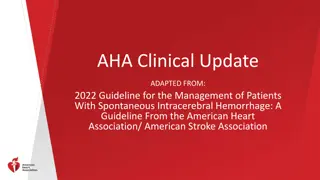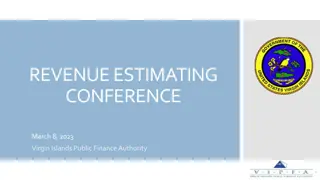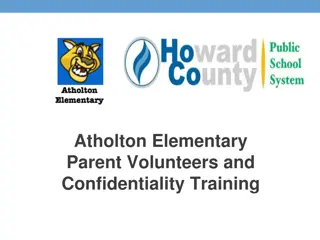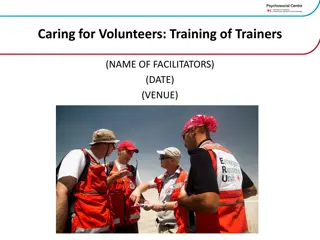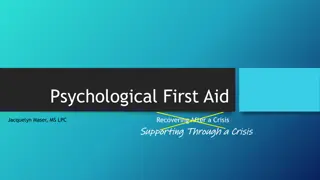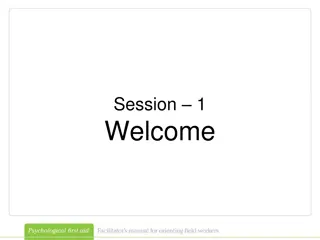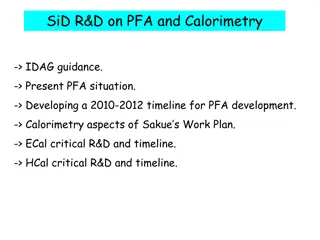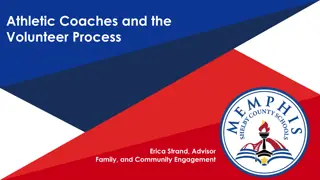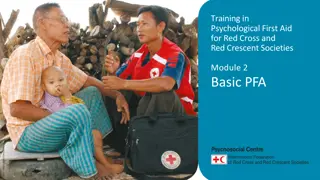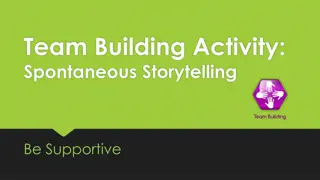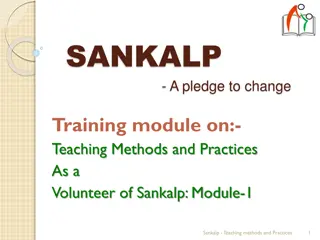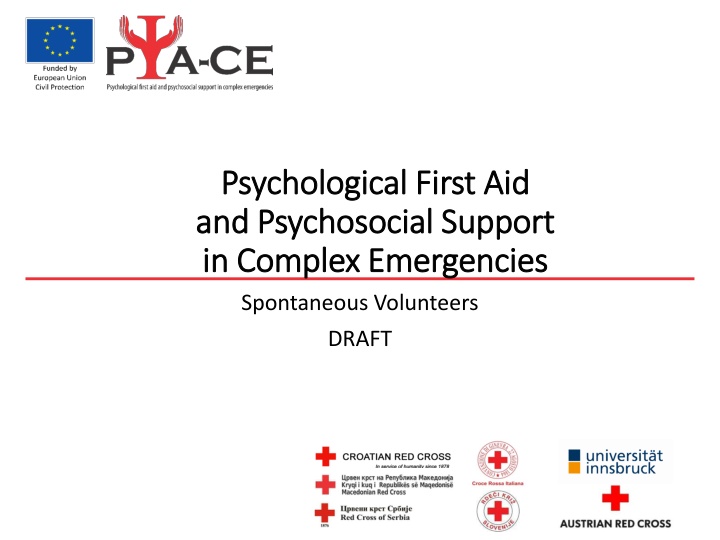
Psychological First Aid and Safety Guidelines for Volunteers in Emergencies
Learn essential psychological first aid and safety protocols for volunteers in complex emergencies. Ensure personal safety, follow rules, and practice self-care and compassion in providing support.
Download Presentation

Please find below an Image/Link to download the presentation.
The content on the website is provided AS IS for your information and personal use only. It may not be sold, licensed, or shared on other websites without obtaining consent from the author. If you encounter any issues during the download, it is possible that the publisher has removed the file from their server.
You are allowed to download the files provided on this website for personal or commercial use, subject to the condition that they are used lawfully. All files are the property of their respective owners.
The content on the website is provided AS IS for your information and personal use only. It may not be sold, licensed, or shared on other websites without obtaining consent from the author.
E N D
Presentation Transcript
Psychological Psychological First Aid and Psychosocial Support and Psychosocial Support in Complex Emergencies in Complex Emergencies Spontaneous Volunteers First Aid DRAFT
Introduction Tour de table: Each person introduces him/herself briefly
Are you ready? 1.Are you, your family and your home safe? 2.Are you flexible and willing to consider multiple ways to help? 3.Are you aware of the potential risks?
Are you ready? 4. Have you considered your personal limitations? Physical and mental health Time to volunteer Appropriate clothing and equipment Transportation to the VRC Special needs that staff should know about (WRHSAC, 2016)
Safety Issues There are basic rules every volunteer has to follow
Safety Issues Safety First Accountability: Always sign in/out Media: don t talk to the media; refer to the team leader Follow Chain of Command Respect Victims; Confidentiality; No photographs of victims and staff Take care of yourself, or you cannot help others Attend any debriefing activity provided (WRHSAC, 2016; points of light institute & cncs, 2011)
Safety Issues + - Bring Water and snacks Hand sanitizer Appropriate clothing Boots and heavy gloves Flashlight Cell phone and charger Contact lists, photo ID Professional credentials Pack to carry it all Cultural awareness Do not bring Children Pets Valuables Weapons Drugs/Alcohol Attitude Personal Agenda (WRHSAC, 2016)
Safety Issues Further rules 1. Eat well 2. Sleep (at least 6 hours) 3. Wash your hands, hygiene 4. No alcohol 5. Know your limits, emergencies are stressful 6. Be cautious and compassionate 7. Practice active listening (WRHSAC, 2016; points of light institute & cncs, 2011)
Liability Information on liability coverage in respective organization
Confidentiality agreement Information on confidentiality agreement, that volunteers have to sign
Code of Conduct Information on code of conduct that all volunteers have to sign that they understood
Code of Conduct I have read, signed and understood the confidentiality agreement I will wear the label and the Volunteer Assignment Card at all times. I will attend any required training and participate in all debriefings. I will respect the rights and dignity of all volunteers and clients I will respect the privacy of all volunteers and clients. I will not take pictures or videos on the premises. I haven t been previously convicted and can provide a clean criminal record I understand that my assigned supervisor is the person I should address regarding any concerns and issues that arise. I will not speak to the press/media and refer any media representatives to my assigned supervisor. I must adhere to the command structures of the organisation responsible for the response efforts. I will complete all forms, reports and other required docmentation. I understand that I am subject to disciplinary action or dismissal. I will only work according to my assignment, skills and training. I will follow all safety instructions I agree that social media releases are not allowed.
Organizational Structure Information on organizational structure, fundamental principles organization stands for, role of organization in current mission, information on the incident/disaster
Registration What s needed to register: Registration forms Photo ID check Basic training/briefing (here and now) Filled in liability waiver form Code of conduct agreement Confidentiality agreement You will receive a vest/label/badge that shows your are a spontaneous volunteer. Always wear your vest/label/badge!
Job Assignments All volunteers are matched with their jobs according to skill sets All volunteers will receive an assignment card Read assignment cards carefully and ask if anything is unclear Keep your job assignment card at all times
When the Job is done 1. return to the Volunteer Reception Center for reassignment and/or debriefing and release 2. Complete a debriefing/review of events 3. Sign out, return badges/vests/labels and supplies



